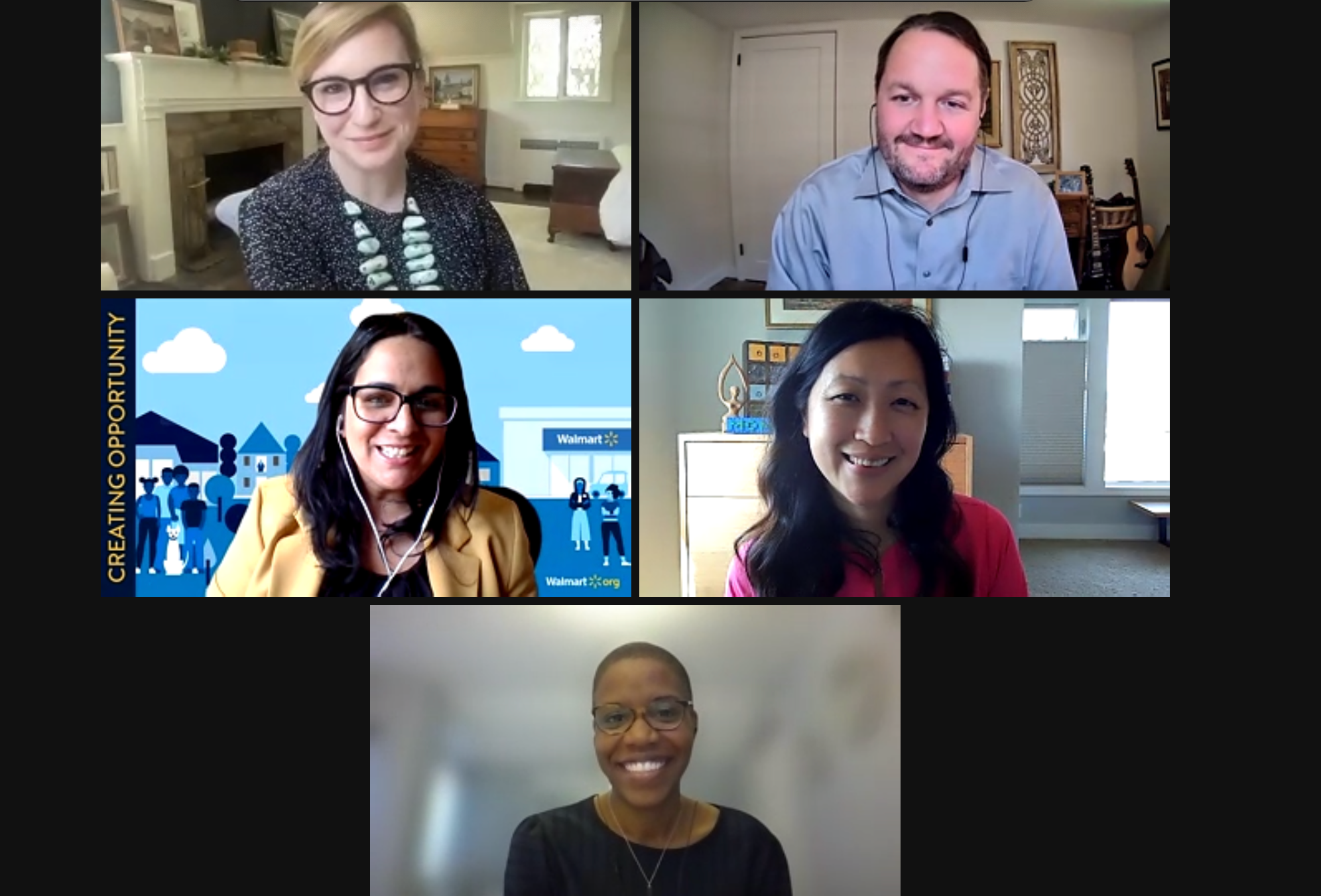Corporate Philanthropy, Equity and Economic Mobility: Reimagining the Intersection of Learning and Work

In the wake of dual upheavals—a pandemic and a racial reckoning—companies have sought ways to support diverse, inclusive pathways to employment. Corporate philanthropy is often at the forefront of this work, and broadening the talent pipeline requires investments at multiple points within the education to employment ecosystem, especially in industries such as tech.
On May 13, the Cognizant Foundation partnered with Whiteboard Advisors to convene a panel of leaders in corporate philanthropy to discuss how major funders are approaching this challenge—panelists included Gayatri Agnew, Walmart.org; Monique Baptiste, JPMorgan Chase & Co.; Naria Santa Lucia, Microsoft; Kristen Titus, Cognizant Foundation; and moderator Paul Fain, The Job.
Paul Fain, editor of The Job, set the stage for the conversation by highlighting how the pandemic “has had a disproportionate impact on the lives and work of lower income Americans, particularly people of color—and higher education enrollments are down sharply, especially at community colleges, and again, particularly among Black and Latino students, as well as men.”
He continued, “As we begin this unprecedented and unusual economic recovery, Washington [D.C.] is currently debating the existence of labor shortages and skills gaps. And the stakes are pretty high here, I have a hard time even typing this number, but we have four trillion in new federal spending proposed by the Administration, much of it on jobs, education and families. On top of all of this, it appears that many Americans, not just the wealthy and privileged, are rethinking their careers. As some have described it, it's a great reassessment of work in America.”
Below are some highlights from the conversation—quotes have been slightly edited for brevity and clarity.
The Changing Philanthropic Landscape
Monique Baptiste: Pre-pandemic, at JPMC, we were already looking ahead at digitization and how to prepare people with skills for the future, to be competitive in the workforce. Covid accelerated that focus as well as the need to ensure equity was centered in the work.
Gayatri Agnew: Covid accelerated a closing of the gap between learning and work—where both occur. We’ve seen a shift in how learning and training is offered to workers, which is a positive. But, to have access to those opportunities you need to be working.
Naria Santa Lucia: The past year, and prior to the pandemic, we shifted our focus to help adults that are in the workforce—to really skill for jobs in the digital economy. There is a big opportunity for us as companies to really think about skills-first hiring, to decide how we can make sure everybody is equal at the starting line. We need to take that chance and give people opportunity regardless of where they went to college or what pedigree they have and who they know.
Kristen Titus: Covid forced so many to pause their educational journey because of job loss or lack of childcare. As we continue this recovery we must be intentional providing wraparound supports—stipends, childcare, broadband access—to remove barriers to reentry.
A Focus on Equity
Naria Santa Lucia: Microsoft employees have been an incredible support for our focus on diversity, equity and inclusion in education and workforce investments. It’s because of that support that we know we can’t let up on this pedal.
Gayatri Agnew: For all of us, advancing equity is a shared goal as both philanthropic funders and representatives of large companies—we can only learn from one another in this area.
Kristen Titus: We need a baseline understanding of how to hold ourselves accountable, how to set metrics and bring our grantees along in this process, how to listen to our grantees and the workers and learners that we aim to serve and really reorient the entire philanthropic landscape around this.
Monique Baptiste: We have focused our energy and efforts on how to really go hard at that issue—how to make sure individuals have the skills of the future needed to be competitive in the workforce and ensure that we build in equitable strategies that reach people where they are and provide viable opportunities that adapt and adjust to the fluidity of the labor market.
Innovative and Collaborative Investments
Gayatri Agnew: Philanthropy’s job is to build new pathways—we should be the risk capital to show what is possible, we need to be architects of trying to rewire routes in the system so we can get not just philanthropic money moving in places, but public capital as well.
Monique Baptiste: We recently partnered with Cognizant on an effort that focuses on rural community colleges. This partnership that we launched really allowed us to look into rural communities and smaller community colleges that have really become the center point of the economy in those geographies.
How Philanthropy Intersects with Federal Policy
Naria Santa Lucia: You could pull all the philanthropy money together, and it would just be a drop in the bucket to what could be done through the government. For every single issue that we tackle, we always think about the grants we can make to move quickly and generate impact—to get the stories, to get those proof points—and then determine policy recommendations and how we can work with the government. You have to do both at the same time.
Kristen Titus: Federal and local policy and initiatives have real impacts on our work and our ability to drive change. And I think what we strive to do both at the Cognizant Foundation and with all of our peers is think about how we use our philanthropic capital to demonstrate what works to unlock some of those federal funds, to think about how we braid funding, to think about how we pair you with what WIOA will and won't cover in terms of supportive services.